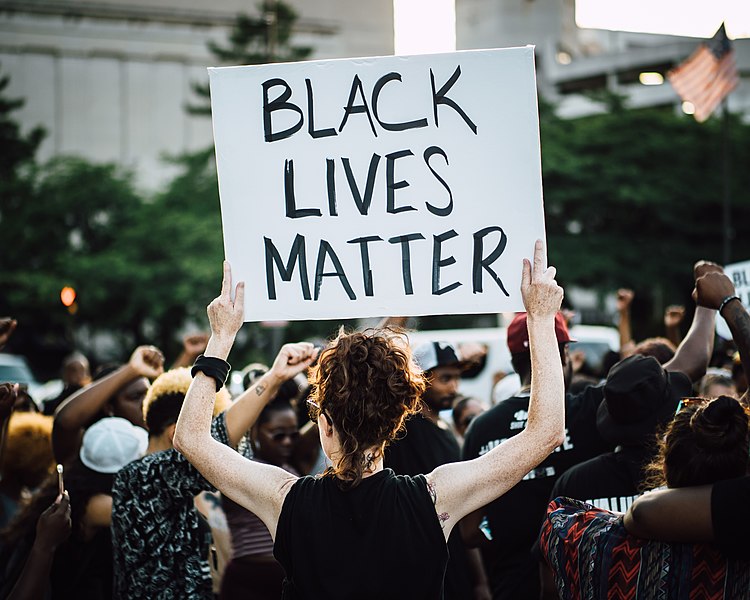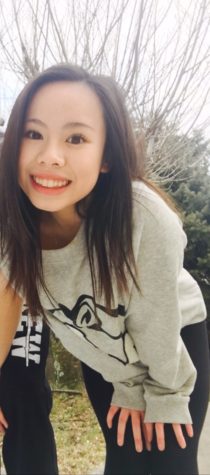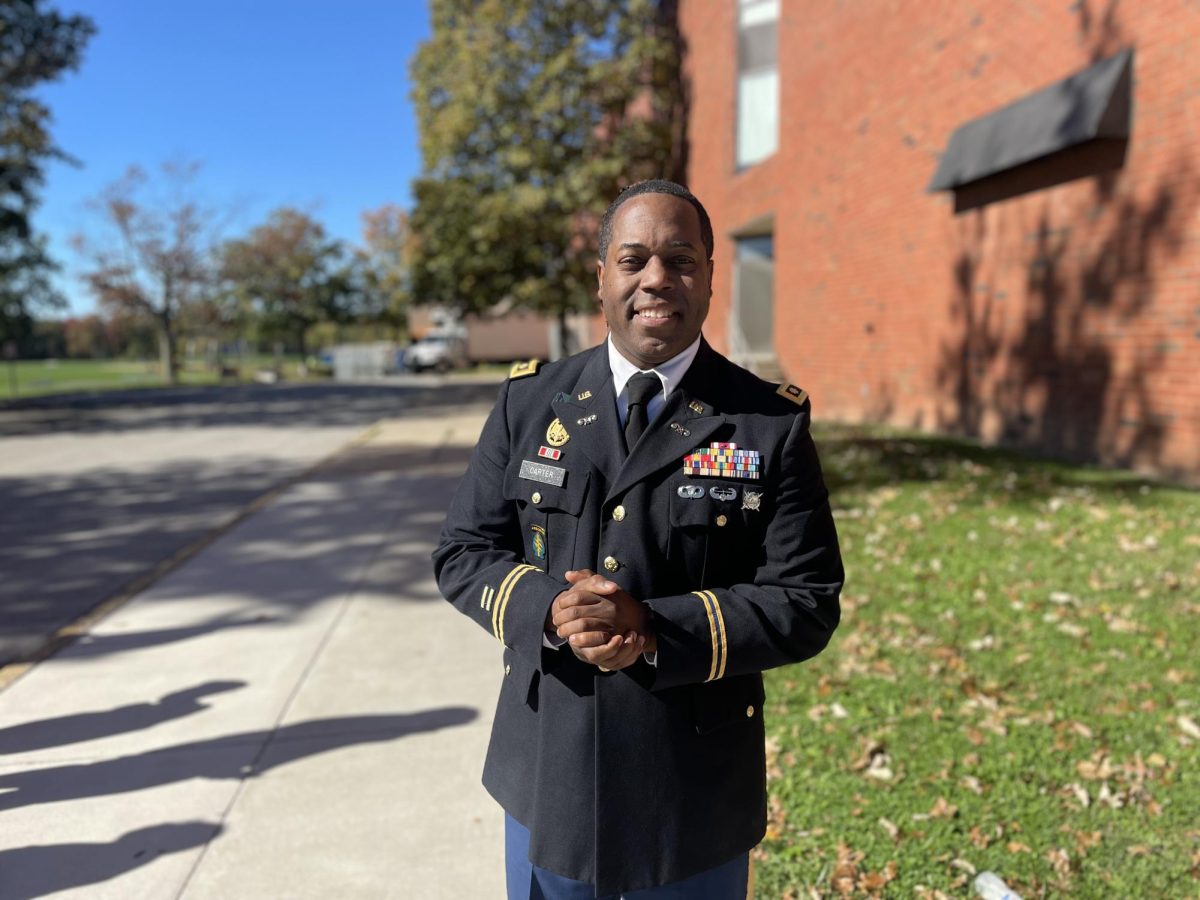It’s Time for Us to Step Up as Allies to ‘Black Lives Matter’
Opinion
John Wayne Lucia III/wikimedia commons
In 2015, Baltimore erupted in protests over the death of Freddie Gray, a 25-year-old black man who died in police custody.
June 10, 2020
One of the most powerful moments on TV recently was on “Orange Is the New Black,” when the beloved character Poussey Washington (played by Samira Wiley) was suffocated to death by Corrections Officer Bayley. It was not only frustrating but deeply upsetting to see Poussey begging the officer to get off as she fought for her life.
Although the circumstances were different, when I watched the video of George Floyd’s death, it brought me back to that scene. Both of them cried out that they couldn’t breathe. Poussey’s death was actually inspired by the death of Eric Garner, who had a heart attack after a police officer choked him, but when I watched it, I did not know about Garner. Instead of connecting Floyd to Garner, I automatically connected Floyd to Poussey, a fictional character.
I realized that I was ignorant and needed to learn more about the effects of racial inequality in the criminal justice system on Black people. My curiosity immediately turned into a want to engage and support the Black Lives Matter movement. The more people that spread awareness on violence and systemic racism towards Black people, the more people will talk about it, making it more mainstream. We, as allies, have to continue to be active and keep the Black Lives Matter movement alive and strong.
I want to emphasize that my opinion on this issue and movement will never matter as much as those of the people directly suffering from systemic racism. My purpose in this article is to not only encourage non-Black people to support the Black community but to encourage them to get educated and do what they can to keep the movement going. It is because I am not a Black person that I will never fully understand the struggles they face and the pain they are going through, not just now, but their whole lives.
However, I acknowledge my privilege and position as a staff member of the Wingspan. I believe it is vital to use this platform to not only spread awareness of the cruel injustice happening to Black people in America but to encourage you to help keep the Black Lives Matter movement going.
Honestly, I have to encourage myself too. You know that phrase “Ignorance is bliss?” I seriously think I live by that. I don’t like talking about controversial issues or subjects and am often afraid to speak my opinion because I find disagreements scary. But when I watched the footage of Chauvin suffocating Floyd, it shook me and made me want to be more vocally supportive of the Black Lives Matter Movement. I rarely dive deep into such serious topics, which is itself a privilege, and I realized after writing this article that I was only scratching the surface of the movement and what it stands for. I learned a lot, from Black Americans’ oppressed history to the reason why prisons are overcrowded and slowly connected the dots.
In the United States, private prisons make money from the government based on how many prisoners they have, so it benefits them to have more “criminals.” It was found by the Federal Bureau of Prisons that in 2016, almost half of the sentenced prisoners in 2020 were serving time for drug charges. As the number of convicted drug offenses increases, so does the prison population. This is true because when prisons are continuously trying to cut costs, they forget about the health and safety of the inmates. In 2017, Nebraska’s prison population was 159% over capacity, understaffed, and under-resourced. It became so bad that when a prisoner complained about chest pains, nobody listened to him, which led to him dying from a heart attack. This is a problem because instead of being looked at as human beings, prisoners are looked at as a source of income. Today, America incarcerates more people than any other country in the world.
Prisons and the criminal justice system are at fault for racial disparity. During his presidency, Ronald Reagan expanded the national war on drugs that was started by Richard Nixon in the 70s’. After the 1981 Military Cooperation with Law Enforcement act, police officers became more hands-on and violent. Neighborhoods in poverty were usually more targeted for drug crimes. As the majority of Black Americans live in inner-city neighborhoods, many were targeted as drug dealers, and even though white people used and sold more crack than Black people, Black people were the ones that went to prison. With time, the war on drugs that was once a social problem revealed itself as a racial problem. Studies have shown that Black people were given much harsher sentences due to being associated with words like “criminal” and “aggressive.” In an experiment, when prisons were described as more “Black,” the participants would support harsher crime policies that contribute to racial disparities.
Not only are there racial disparities when committing the same crime, but Mapping Police Violence found Black people are three times more likely to be killed by police officers than white people are. George Floyd’s murder was clearly one-sided. When people on the sidewalk asked Chauvin to get off of Floyd, Chauvin used the poor excuse that Floyd was on drugs. His murder is an example of racial targeting and the poor association of Black people and drugs that many other Black victims face.
The way police have been handling the reactions to Floyd’s murder also highlights the differences in the ways black people are treated by police. Recently, Black Lives Matters protesters in Minneapolis were protesting for the justice of the discriminatory murders of Floyd, Breonna Taylor, Ahmaud Arbery, and many other victims, and were assaulted and tear-gassed, but when armed, mostly white, protestors entered the Michigan statehouse to protest the coronavirus restrictions, which were rightfully enforced at the time, the protesters were peacefully escorted out.
These past weeks have been filled with apparent racial injustice, and for many, Floyd’s murder was the tipping point. People were outraged, as they should have been, and protests sparked across the nation. The protesters demand justice for Floyd and police reform legislation, and after two weeks, the protests seem to be working. Chauvin is now being charged with second-degree murder, while his accomplices have been charged with aiding and abetting. Minneapolis City announced a commitment to disband the Minneapolis Police Department, while the mayors of other cities like New York and Los Angeles have pledged to cut funding for their city’s police departments.
Protests are working and we need to keep this movement going. To be true allies of the Black community, we need to have genuine intentions. We must take a look at ourselves and recognize our privileges. It might be uncomfortable to be so candid about our feelings, but it’s important to have this realization so we can have the ability to combat anti-Blackness in our own communities. Don’t be afraid to fact-check your friends or relatives. They need to be educated and corrected if they mix up their facts, and it is your job to do so. Small changes in our communities will make a big difference in the outlook of America.
The Black Lives Matter movement can’t be a one and done kind of situation, where we post one picture on social media and hashtag it Black Lives Matter. That’s not going to cut it. Two years ago, there was a trending movement to end gun violence; hundreds of thousands of people protested this issue. Our school even staged a walkout, but the fight slowly died down, and little to no legislation was passed. We can’t let this happen to the Black Lives Matter movement.
If you can’t come out and protest during this pandemic, there are several other ways to support the Black community. For starters, you can educate yourself. There are movies on Netflix like “13th” and “When They See Us” and books like “So You Want to Talk About Race” that give you a glimpse of the struggles Black people go through. You can also sign petitions, donate to different organizations, and bail funds for protesters who got arrested. Some organizations and petitions can be found below.
Our role is to support the black community as best as we can. Black people make up only 12.6% of the US population, so we, making up the rest, have to do our part and make sure that the Black community’s voices are heard. Please don’t let the movement die down. An Instagram post made by our very own NAHS College Career Center post stated “A revolution has many lanes- be kind to yourself and to others who are traveling in the same direction. Just keep your foot on the gas.” Let’s continue to support the Black Lives Matter movement and be the best allies we can be!



